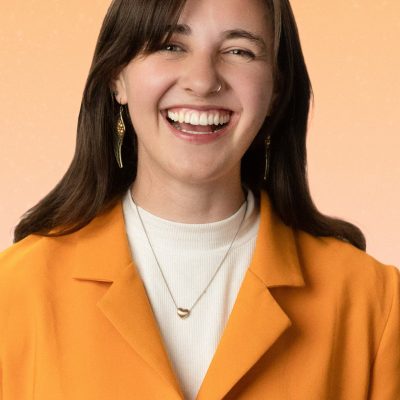Article
Mira has long been passionate and committed to combating interpersonal violence and supporting survivors after experiencing the impacts of poor survivor supports in her community in high school.
After leading her college’s survivor advocacy group and being involved in groups and organizations that addressed interpersonal violence and abuse from both a prevention and a survivor support standpoint, she felt that it was only fitting to carry on that work in her Humanity in Action project: an international Zoom panel followed by presentations and conversations within local advocacy groups.
Project Development
As a Hansen Leadership Institute Fellow in San Diego, Mira made connections with fellows from around the globe who shared her passion for violence prevention. One fellow in particular, Rotem Oreg from Israel, was excited to collaborate and took the lead in creating the international Zoom panel through his organization Israeli-Democratic Alliance.
Rotem was able to contact and connect organizations from the U.S. and Israel to serve as panelists. Mira spoke to experiences of violence on college campuses and utilized a disability and LGBTQ+ justice centered lens throughout her participation on the panel.
Speakers came from different backgrounds, countries, and religious communities…
About the event

The panelists for the Zoom event came from different backgrounds, countries, and religious communities. “Each panelist was able to raise awareness and speak to the challenges that survivors they work with face and highlight directions for further care and dismantling the structures that create violence,” Mira shares.
These conversations ranged from cultures of silence in Muslim and Jewish communities to the challenges of ableism, homophobia, sexism, racism, and other power structures that lead to increased violence and lower access to support. This allowed for a building of collective knowledge as well as a way to share insight on how to care for survivors and work to build better cultures of support across the globe with an online audience.
“Presentations and group conversations allowed for an advancement of collective knowledge.”
The subsequent trainings conducted with local survivor advocacy groups further expanded on the knowledge that was shared. “Presentations and group conversations allowed for an advancement of collective knowledge on intersectional and accessible supports to better serve survivors,” Mira explains.
This resulted in changes to how organizations communicated via social media as they increased the accessibility of fonts and screen reader accessible captioning. While improving and adapting survivor supports is an ongoing process, these conversations were a push towards real and meaningful change within the communities and organizations that participated.
“The primary resource required for this project was connection.”
Project Partnerships

The primary resource required for this project was connection. This was fortunately fairly easily met by Mira and Rotem’s connections through their work and personal experiences. The organizations involved (including Israeli-Democratic Alliance, American Muslim and Multi-faith Women’s Empowerment Council, Shalom Bayit, and Jewbian Princess) were ones they had previous ties to and were happy to participate.
Furthermore, the project drew from online resources like Zoom, Instagram, and Facebook Live to get word out about the event. Mira’s experiences presenting and creating social media content were utilized in the continuation of the project at her school, Middlebury College, and in her surrounding community. She utilized design software like Canva to create content and further resources.
Next Steps
Following the Zoom event, Mira created presentations and initiated discussions on intersectional care and accessible support within various advocacy organizations. This is an ongoing effort.
Updated August 2023




